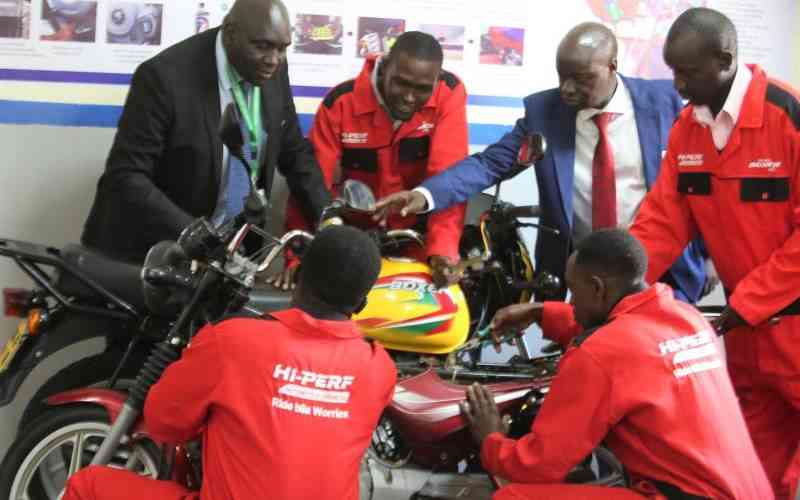
The Eldoret National Polytechnic has become among the pioneer Technical and Vocational Education Training (TVET) institutions to roll out programmes on motorcycle assembling in the country.
The institution, which is based in Uasin Gishu County, has embarked on an ambitious training model targeting to impart new skills to its trainees.
According to Wesley Rutto, the institution’s head of mechanical and automotive engineering, the initiative will offer learners innovative training specialising in motorcycles.
He said the special unit will focus on standard procedures in motorcycle engine systems, power transmission, braking, suspension and lighting systems. The training centre at the polytechnic was launched last Friday through a working partnership between Bajaj Group Auto Ltd of India and The Eldoret National Polytechnic.
“The regional training centre under the Eldoret National Polytechnic has rolled out the programme for trainers who are set to impart knowledge and skills to students,” said Rutto. “We have trained six trainers and four technicians who will train over 20 students venturing into motorcycle assembling. This is an opportunity towards empowerment and job creation.”
Practical courses
Rutto said the establishment of the regional training centre, which has been embraced by the local community has attracted several high school leavers eager to enroll for the various practical courses that will provide the right skills.
“When applied effectively, this training will make a difference in the communities and in society in general through improving livelihoods. It builds social equity aimed at bringing downgraded people to higher levels in society,” stated Rutto.
Sheila Makori Buyaki, a third-year student at the institution and beneficiary of the programme says she will apply skills acquired to better her livelihood and that of her peers.
She urged the government to put more resources into the construction of more regional centres in counties to enable more school leavers to access training opportunities.
“I will target boda boda riders and Saccos to help them upgrade their skills in assembling and maintenance of motorcycles,” she added.
Another student, Stephen Nato lauded the programme, which he noted, is in line with the new Competency Based Curriculum (CBC), which is more practical.
“The skills that I have acquired have enabled me to dismantle and also assemble motorcycles without seeking help from technicians operating in various major towns in the country,” said Nato.
Joseph Saina, a boda boda rider who operates within Eldoret town says they have been relying on ‘unprofessional mechanics’ when seeking repair services, saying they hope to access quality services from trained personnel.
“We are happy to have qualified technicians from the regional training centre at the Eldoret National Polytechnic who are at hand to help fix our problems,” he said.
Speaking after the launch of the training programme, the deputy director in charge of policy at the TVET Directorate Frank Mukuna said the motorcycle workshops would link trainees to the industry.
He said the new technologies will enhance the quality of training, thus increasing the employability of qualified graduates.
“The country is facing challenges and the government is committed to ensuring that Kenyan students get proper education. This motorcycle industry will involve setting standards in designing curricula, thus producing competent trainees with the necessary market skills,” said Mukuna.
The deputy director who represented TVET Principal Secretary Dr Esther Moria said the government gives priority to the TVET sector.
He said the State sees the sector as a chief enabler of the attainment of Vision 2030 and the sustainable development goals, and the continental Agenda 2063. “For the government to come up with such an education initiative, we have found priority placement in the current government’s Bottom-up Economic Transformation agenda (BETA),” Bukuna said.
“We laud the partnership between the Eldoret National Polytechnic and the Bajaj Group. This is the spirit of the government policy on public-private partnership (PPP). It’s my humble gesture to appreciate Bajaj Group for the massive donation of equipment, motorcycle spares, engineering tools and manpower.’’
Bajaj Cycle Workshop Head of Department Uday Maliredoi said the Bottom-up economic transformation agenda focuses on the empowerment of the population at the bottom of the pyramid.
He said their motorcycle investment aims at promoting inclusive growth, which he noted is key to sharing prosperity in Kenya and India. He promised to bring in technicians from his country to impart motorbike techniques and skills to the students
Eldoret National Polytechnic Chief Principal Charles Koech said the motorcycle training initiative is aimed at supporting the bodaboda industry to enhance skill acquisition.
“I personally want to ask the president of Bajaj to consider some pioneer graduates for opportunities in India and also consider capacitating our trainers in some of your top-notch training centres in your country,” he observed.
Koech lauded the collaboration with Bajaj Auto Ltd, the fourth largest two-wheeler and the world three-wheeler manufacturer in the world.